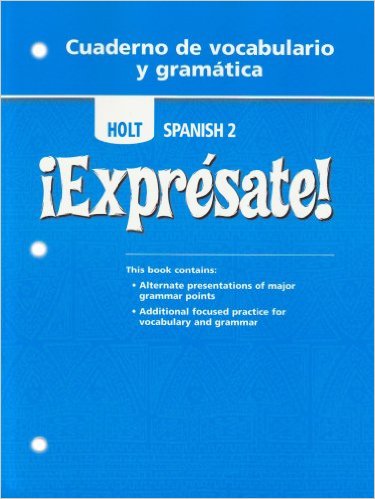
All Solutions
Page 52: Gramatica
2) pudo tomar
3) pudo llevar
4) pudimos hablar
5) pude encontrar
In addition, we must match each completed sentence with the sentences in the box to the right. For this, we will make sure that the subjects coincide and that the sentences are coherent with each other.
Remember that the verb *traer* is irregular in the past tense. For the third person singular the preterite tense is: **trajo**.
In the box, the sentence that matches this is option **(c)**. The subject agrees and is a consequence of the above: if Martin did not bring his umbrella, he could not arrive dry.
| Spanish|English |
|–|–|
|Martín no trajo su paraguas. | Martín did not bring his umbrella.|
For the first person plural, the past tense of *traer* is **trajimos**.
The sentence in the box that matches is option **(a)** because it is the only one in which the subject matches and makes sense with the next sentence.
| Spanish| English|
|–|–|
| Nosotras no trajimos el cepillo. | We did not bring the brush.
For the second person singular, the preteite tense of *traer* is **trajiste**.
The sentence of the box that corresponds to it is **(f)** for the agreement with the subject and the context.
| Spanish| English|
|–|–|
|Tú no trajiste tus lentes de contacto. | You did not bring your contact lenses.|
In this case, as we have the third person plural, the preterite tense of *traer* is **trajeron**.
If we see among the sentences in the box that remain, the only one in which the subject matches is **(e)**. Also, it makes sense that if they left their cell phones, they couldn’t call their friends.
|Spanish |English |
|–|–|
| Luis y Carlos no trajeron sus teléfonos celulares. | Luis and Carlos did not bring their cell phones.|
The preterite tense of the verb *traer* for the first person singular is **traje**.
The only sentence with this same subject in the box is option **(b)**.
| Spanish| English|
|–|–|
| Yo no traje mi lápiz labial. | I did not bring my lipstick. |
This case is like sentence # 1. The preterite tense of *traer* in the third person singular is **trajo**.
The only sentence remaining in the box is **(d)**. This sentence matches the subject and the context of the next one.
|Spanish |English |
|–|–|
|Lorena no trajo sus llaves. | Lorena did not bring her keys. |
“No te olvides de darle de comer al perro“ – Don’t forget to feed the dog.
2) cepíllate
3) Date prisa
4) Lávate

